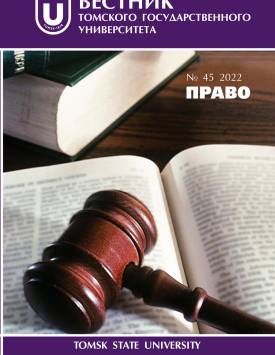The main trends in the development of the science of private law in modern Russia
The article continues the development of the topic of convergence of public and private law. The social background is determined by the Covid-19 pandemic. The private legal aspects of the emergency situation, force majeure, requisition, and the unknown absence of people were among the priorities. Civilists have been familiar with these categories for a long time. Wars, natural disasters always accompany society and at different times the legal reaction of the state to human misfortunes becomes extremely important. These legal concepts are consistently analyzed in this manuscript. The specific contribution of specialists of the Tomsk State University Law Institute is shown. Scientific forecasts and the approximate fate of the necessary regulatory arrays have been determined. The expediency of working out the civilistic block of norms in complex federal laws, in particular, in the Information Code, is substantiated. The article proposes a number of measures aimed at strengthening the protection of citizens' interests. The thesis about the need for more radical transformations of the Family Code is repeated, since the reforms of the last two decades have turned into a process of "patching holes"; the fragmentary nature of the measures taken gives negligible results. The author suggests returning to the discussion of the development of the Children's Code of the Russian Federation. The question of the need for a Children's Code in Russia in the literature accessible to the Soviet reader was raised more than a hundred years ago. Professor M.N. Gernet in his now famous monograph called one of the paragraphs "Children's Codes". There was no deeper and more thorough research in our private law literature. This is quite understandable, the criminological aspect "scared off the civilists." M.N. Gernet gave an overview of the content of children's codes (or regulations) of a number of countries. In previous works, the idea of abandoning the Housing Code was justified. Here are the arguments in favor of replacing it with another legal form. The issue of replacing the Housing Code of the Russian Federation is not difficult to solve at all, there is good experience. After all, the first Housing Code of the RSFSR appeared only in 1983, and did not live long. The following code could not be made qualitative, consistent with the Civil Code. It is impossible to include all the huge housing legislation in a small diversified regulatory act. Thus, the way to improve housing legislation is open for scientific research. The author declares no conflicts of interests.
Keywords
emergency, requisition, legal nature, unknown absence, Information Code, Children's CodeAuthors
| Name | Organization | |
| Manankova Raisa P. | Tomsk State University | loykon@rambler.ru |
References

The main trends in the development of the science of private law in modern Russia | Tomsk State University Journal of Law. 2022. № 45. DOI: 10.17223/22253513/45/13
